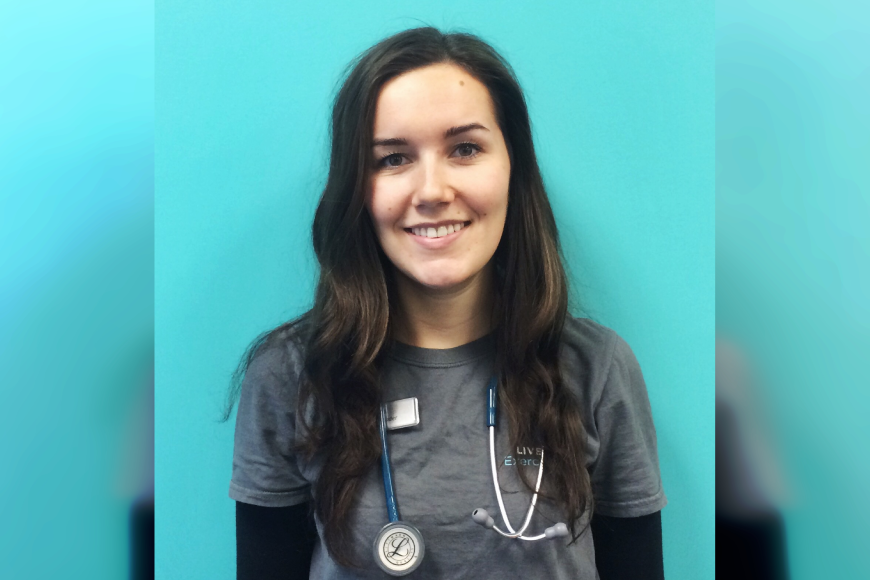
I knew that co-op work terms would greatly enhance my education and I would gain skills and experience that I could never get from a classroom, but the type of knowledge that I am walking away with is not what I expected.
We are all students for the same reason– to learn. While the subjects we choose to learn and the motivations we have to learn differ, that is one common purpose that we all share. Ever since I began my studies in Health Sciences I looked forward to joining the SFU Co-op program, because I knew that the work terms would greatly enhance my all-important education. While I knew that I would gain skills and experience that I could never get from a classroom, the type of knowledge that I am walking away with is not what I expected.
I decided to apply for positions through the BPK faculty with my Kinesiology minor, and after a long process of applications and interviews (which was an enlightening experience in and of itself), I landed a position as an Exercise Leader at Live Well Exercise Clinic in White Rock/South Surrey. As a chronic disease and lifestyle management program, my role at Live Well for the eight-month term would be to monitor participants’ vitals, assist the clinical exercise physiologist in exercise prescription, and ensure that all the exercises were being performed properly and safely. I saw this as an amazing opportunity to expand my kinesiology skills, and while there is no doubt that I have, the most valuable thing I have gained is people skills.
Working With People
I believed that years working customer service in the food industry had given me appropriately developed people skills. However, serving people beer and burgers for an hour each did not prepare me for working closely with clients for months, especially around such an emotional aspect of their lives– their health. I was used to focusing on mainly the physiological aspects of health and fitness in the classroom, and it was eye opening for me to see health as a whole person, including emotional and mental health. Not only was I there to help the participants exercise, but also to support, encourage, and motivate them.
As a student accustomed to writing essays rather than having conversations, this aspect of the job did not come easy at first. I would say that there are three main skills I have developed over the last eight months that helped me connect with people.
1. Be an Active Listener
I don’t always know the right thing to say to people (actually, I rarely do), but often just listening to what they have to say is all they need from you.
2. The Art of Small Talk
Not everyone is born with the gift of easy conversation, and for those of us who aren’t, the trick is to literally grin and bear it. It will feel forced. It will feel awkward. But you will never get past the small talk and into the truly rewarding connections if you don’t.
3. Give People a Second Chance at a First Impression
Everyone, professionals included, has good days and bad days. Just because you did not connect with someone the first (or second, or third) interaction, does not mean that you never will.
Working For People
Another limiting habit of student life is independence. Aside from the occasional dreaded group project, our work is ours and ours only. When we hand in an assignment or a test, the product only reflects ourselves, and thus we are only accountable to ourselves. When you are part of a company, your work reflects not just you, but your workplace as a whole. Having a bad day or a bad interaction when you represent your company becomes much bigger than a bad grade when you represent yourself. Working with people, I had to become mindful of the core values of the company and remain aware of projecting the right image to represent Live Well.
While adopting values that were given to me rather than adapted myself was a foreign concept at first, it was also rewarding. To work for, and with, a staff that is so genuinely committed to the company’s mission was inspiring. In such a positive environment where everyone is working towards the same purpose, you can’t help but to adopt it as your own.
At the end of my co-op, I am leaving with more well-rounded and practical skills than I would have ever learnt in class. Working in your field of study is not just about knowing and understanding the facts and concepts, it’s also about being able to communicate and apply them in real life situations with real live people. Anyone can pick up a textbook and memorize the theory, but to learn the practical skills you have to put the book down and go out and get them.
Beyond the Blog
-
For more opportunities like Tessa's, visit SFU's BPK co-op page!
-
Learn more about Live Well Exercise Clinic here!















